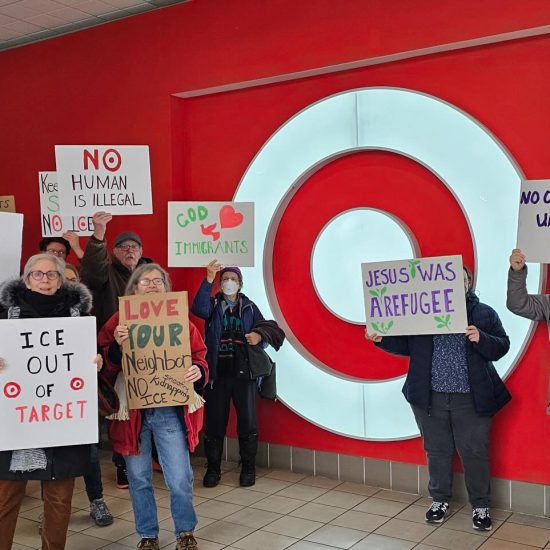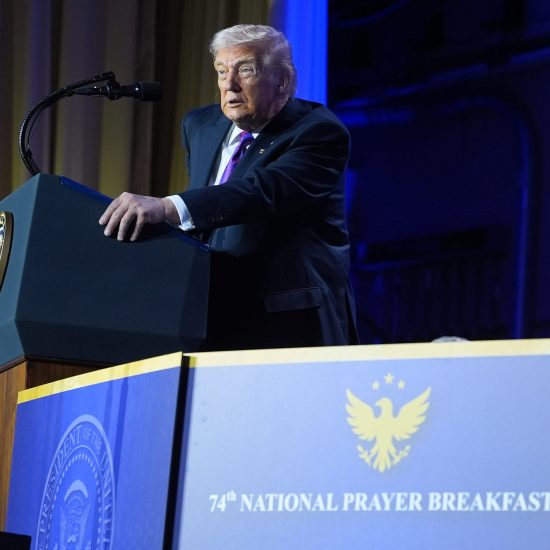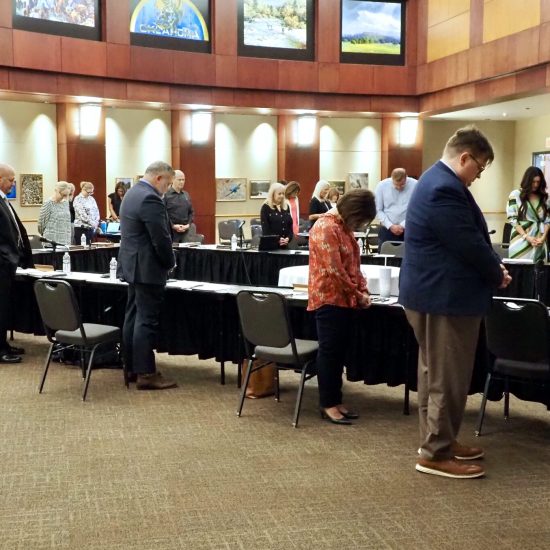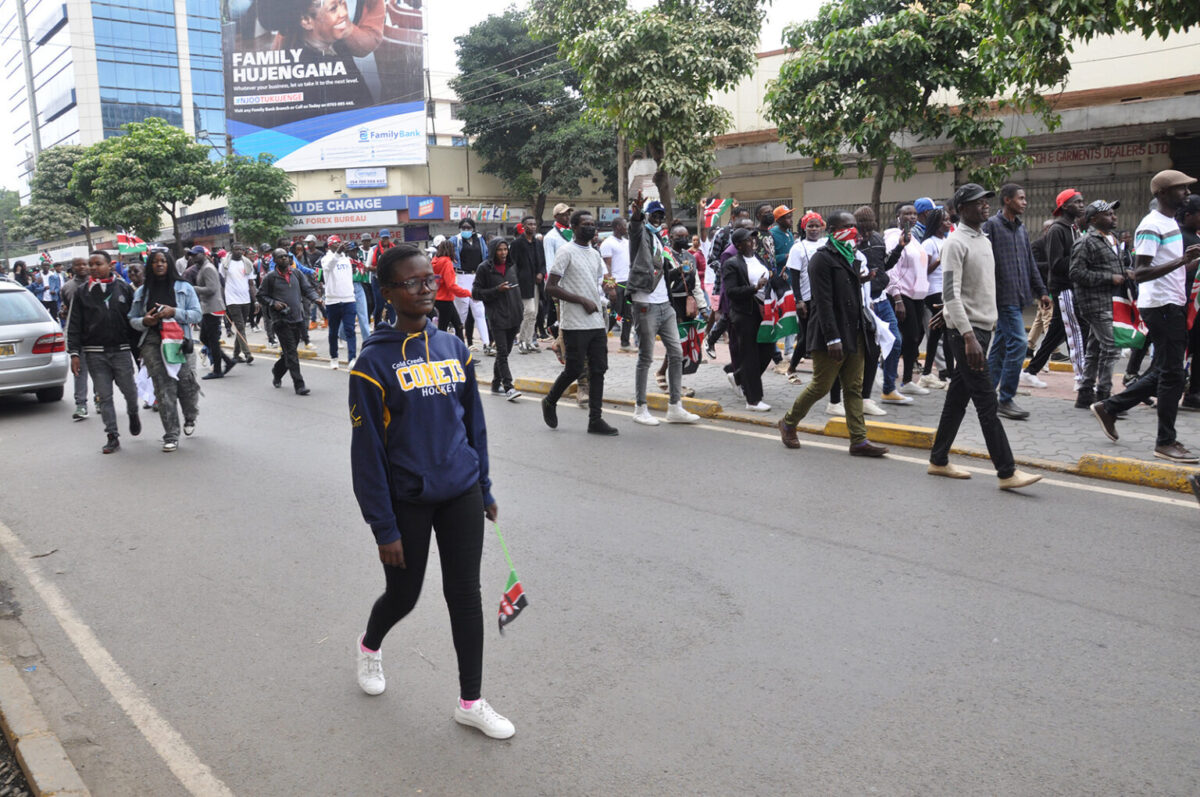
NAIROBI, Kenya (RNS) — Five weeks after young Kenyans poured into the streets under the banner of “Gen Z,” forcing changes in the government, they have also called Christian churches to account for how denominations relate with politicians.
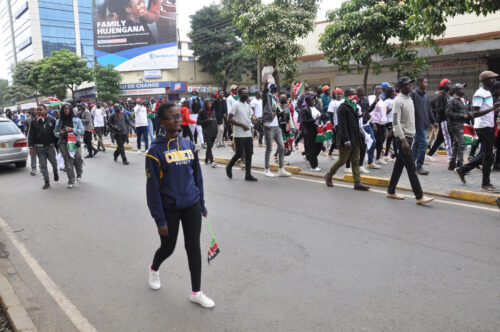
Kenyan youth protest over-taxation and other human rights violations during a march in Nairobi, Kenya, June 30, 2024. (Photo by Fredrick Nzwili)
Rejecting a controversial finance bill floated by the government in June, the teenagers and young adults protesting have demanded wide-ranging reforms from President William Ruto, whom they have nicknamed Zacchaeus, after the diminutive chief tax collector who appears in the New Testament’s Gospel of Luke. For the protesters, reducing taxes is analogous to Zacchaeus climbing down the sycamore tree and meeting Jesus, as he does in the gospel.
Ruto withdrew the bill on June 26, a day after the youth stormed parliament, but the youth have continued to press for change, publishing a list of demands, including tackling corruption, ending impunity and unemployment, and taming the rising cost of living.
“The young people have come out to protest because of the difficult life they are going through,” the Rev. Jackie Makena Mutuma, a young Methodist Church in Kenya cleric, told Religion News Service. “Many of them are unable to cope economically due to some government policies and the many burdening taxes.”
Though some of Kenya’s clergy have protested alongside the young people, some of the generation’s anger toward faith leaders arises from a view that some of the clerics and denominations were too close to the state, according to the Rev. Joseph Njakai, an Anglican priest in the Diocese of Mt. Kenya West.
“It is a wakeup call for the churches,” he said. “The churches should remain independent, and I think the youth are angry that this is not the case. They are trying to cleanse the churches, already caught up in an unhealthy relationship with the political class.”
Among the social media hashtags that have cropped up during the protests, such as #OccupyParliament and #OccupyEverywhere, is #OccupyChurches.
“The young people felt the church was silent … as it was understood (during) the 2022 elections that it is ‘in bed’ with the government,” said Mutuma, who participated in some marches. “This is another challenge. The church has to be proactive not reactive.”
Some 85% of Kenya’s 54 million population profess a Christian faith. About 11% are Muslims, while Baha’i, Hindu, Buddhism, and African traditional religions constitute 2%. People under the age of 35, meanwhile, constitute 79% of the population.
Kevin Maina, a young Christian leader, pointed to the church leaders’ greed, saying that politicians have been accused of looting cash from the government and donating it at church fundraisers, known as harambees, to which they’ve been invited.
“Widespread corruption and the misappropriation of funds by government officials meant for various development projects have eroded trust in the system,” said Maina.
But more often, the church is seen as an ally of those officials. “This undermines the church’s moral authority and its ability to speak truth to power,” said Maina. “The church’s frequent visits to the State House (the Kenyan president’s official residence) and perceived exclusive consultations with the president, while neglecting direct engagement with the broader populace, particularly the youth, has amplified doubts about the church’s impartiality and independence.”
Individual churches and mosques have supported the youth movement, calling for justice for those killed by law enforcement in the protests, while urging the youth leaders to accept offers to negotiate.
In Nairobi, the Roman Catholic Holy Family Basilica, the Anglican All Saints Cathedral, and Jamia Mosque have all housed youth-led rescue and medical centers. On July 7, Catholic and Anglican leaders held interdenominational memorial and prayer services for the lives lost in the protests.
So far, the death toll stands at 50, with over 400 injured, the Kenya Human Rights Commission said on July 16. Human Rights groups say the police have been using live ammunition on the protesters.
“The killing of dozens of peacefully picketing Kenyans by the police is totally unacceptable. It must never be repeated,” said the Rev. Canon Chris Kinyanjui in a June 27 statement.
Since the protest, Ruto has signed a law allowing the constitution of the electoral commission and accepted the resignation of the inspector general of police.
Church leaders said this signals a move toward restoring hope, after Ruto had finally listened to the cry of the people, sharply brought about by the youth.
But Mutuma said despite the positive response, there are things the government could do better. “As a young Kenyan, I think we have passed our message. Our message is so clear,” she said.

